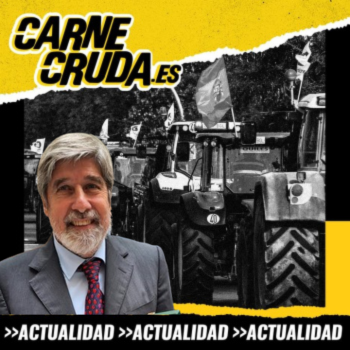José María Sumpsi, CEIGRAM researcher and Professor at the UPM, participated in the broadcast of Carne Cruda in a program with the title “The field is fed up: beyond the noise”, which have addressed issues such as the claims of Spanish and European farmers, as well as the problems they face and the solutions from which they could benefit. The new CAP (2023-2027) was also discussed.

Farmers and livestock farmers should consider environmental policies aimed towards sustainable agricultural systems, such as the European Green Deal and Farm to Table, as a long-term advocacy for their sustainability. On the other hand, regulatory frameworks that have also been criticized in these protests, such as the 2030 Agenda, should not be seen as a barrier to agricultural activity, and weakening the environmental measures that are being taken based on scientific evidence, is not the solution.
The demands of the farmers and ranchers who are protesting these weeks throughout Spain are heterogeneous, just as there is great diversity in the Spanish countryside. The main demands include a CAP better adapted to the needs of small and medium-sized farmers, as well as the implementation of a series of measures to combat the lack of replacement and the loss of young people. Regarding food imports, the European Union is asked to negotiate with the World Trade Organization to establish mirror clauses, i.e., that the requirements for imports from third countries be equal to local ones, although this will be difficult to implement.
The European Union devotes one third of its budget to the Common Agricultural Policy (CAP), which is the EU’s largest budget item. CAP aid is divided into a first pillar providing direct aid, which in this new CAP 2023-2027 is granted not only per hectare, but also per volume of production, crop and yield. However, the program has defended the idea that direct aid should have a strict maximum limit, and that it should be directed towards small and medium-sized farmers, instead of large farms which, according to data from the National Agricultural Accounting Network, are profitable by their own condition. It is the small and medium-sized farmers, who favor crop diversity to a greater extent, who should receive a greater amount of this direct aid, in order to compensate for the additional cost of producing in Europe with the environmental and labor requirements that have to be met here, and to mitigate competition with third countries which, although they produce at lower costs, are not subsidized in most cases. The second pillar of the CAP is indirect aid, related to rural development, youth and gender, agricultural modernization, improvements in the food chain or environmental impact measures, accounting for only 25% of the total budget, although it can create the social fabric that makes the countryside economically, socially and environmentally sustainable.
It is true that the latest CAP reform has reinforced sustainability criteria, but unlike the Green Pact, it is not environmental criteria that have determined it, but market criteria. In any case, in response to the protests in Europe, the EU has begun to make the CAP more flexible and to delay the implementation of some of its enhanced cross-compliance measures (standards and good agricultural and environmental practices).
Spain’s Food Chain Law is groundbreaking and one of the most modern in Europe; however, there is a need to provide the Price Observatory with a larger budget and more staff to ensure compliance with the Food Chain Law by evaluating each product and looking for where in the chain disruptions are occurring.
In conclusion, the Carne Cruda program has highlighted the complexity and diversity of the challenges facing the Spanish and European agricultural sector. The importance of environmental and regulatory policies that promote long-term sustainability has been underlined, as well as the need for a CAP more adapted to the realities of small and medium-sized farmers, proposing a more equitable distribution of direct CAP aid and a greater allocation of indirect aid. The need for training and the recovery of agricultural extension to ensure greater support and awareness of those working in the primary sector has also been pointed out. Despite progress, it is clear that there are still challenges to overcome, and it is crucial that both the European Union and national governments are committed to addressing these issues effectively, ensuring the economic, social and environmental sustainability of the agricultural sector.
To listen to the full program (in Spanish), click on the following link
